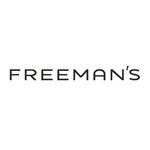[Presidential] Jackson, Andrew, On the Way to Araby!
About Seller
2400 Market St
Philadelphia, PA 19147
United States
Established in 1805, Freeman’s Auction House holds tradition close, with a progressive mind-set towards marketing and promotion, along with access to a team of top experts in the auction business. And now with offices in New England, the Southeast, and on the West Coast, it has never been easier to ...Read more
Two ways to bid:
- Leave a max absentee bid and the platform will bid on your behalf up to your maximum bid during the live auction.
- Bid live during the auction and your bids will be submitted real-time to the auctioneer.
Bid Increments
| Price | Bid Increment |
|---|---|
| $0 | $25 |
| $500 | $50 |
| $1,000 | $100 |
| $2,000 | $200 |
| $3,000 | $250 |
| $5,000 | $500 |
| $10,000 | $1,000 |
| $20,000 | $2,000 |
| $30,000 | $2,500 |
| $50,000 | $5,000 |
| $100,000 | $10,000 |
About Auction
Feb 18, 2021
A collection of important books and manuscripts curated by Darren Winston, Head of Department Books, Manuscripts, Photographs & Photobooks at Freeman's. Freeman's info@freemansauction.com
- Lot Description
[Presidential] Jackson, Andrew
On the Way to Araby!
(New York: Edward Williams Clay & Henry Robinson, ca. 1836). Lithographic political cartoon, satirizing president Andrew Jackson and his administration's battle with the United States Bank. Scattered minor soiling. 9 3/4 x 14 3/4 in. (247 x 374 mm). Includes one engraved portrait of Jackson, one engraved view of the Capitol Building, and a postcard of Jackson's estate, The Hermitage.
Political cartoon depicting a frightened Andrew Jackson, fleeing at the news of the Bank of the United States being rechartered in Pennsylvania. After a protracted battle to dismantle the Second Bank of the United States in 1832, news of the bank's rechartering in Pennsylvania sends Jackson in a frightened sprint, with his typical weapon of choice, the veto (here depicted as his broken cane), rendered useless. Depicted at right is bank president Nicholas Biddle holding the new charter, and proclaiming from the steps of the old bank, "General allow me to introduce an old friend with a new face!" Vice-president Martin Van Buren--heir apparent to the presidency--grasps at the policies of the Jacksonian era, here in the form of his cloak.
"The expiration of the bank's federal charter in 1836, following Jackson's famous veto, freed the bank of many of the restrictions on its private actions attached to its public responsibilities. Under a new charter from the State of Pennsylvania, the bank lost its power to restrain the state banks and the boom-and-bust economy they fueled, but it retained its matchless resourcess of private capital and credit, enabling it to join in the speculative boom of the Jacksonian era with new abandon...(Nicholas) Biddle tuned his reborn 'United States Bank' into an exuburant investor in economic enterprise on its own account..." (p. 164, Jeffrey Sklansky, Sovereign of the Market: The Money Question in Early America).
The ensuing Panic of 1837, partially the result of Jacksonian monetary policy, would go on to force the closure of the bank in 1841.
- Shipping Info
-
No lot may be removed from Freeman’s premises until the buyer has paid in full the purchase price therefor including Buyer’s Premium or has satisfied such terms that Freeman’s, in its sole discretion, shall require. Subject to the foregoing, all Property shall be paid for and removed by the buyer at his/ her expense within ten (10) days of sale and, if not so removed, may be sold by Freeman’s, or sent by Freeman’s to a third-party storage facility, at the sole risk and charge of the buyer(s), and Freeman’s may prohibit the buyer from participating, directly or indirectly, as a bidder or buyer in any future sale or sales. In addition to other remedies available to Freeman’s by law, Freeman’s reserves the right to impose a late charge of 1.5% per month of the total purchase price on any balance remaining ten (10) days after the day of sale. If Property is not removed by the buyer within ten (10) days, a handling charge of 2% of the total purchase price per month from the tenth day after the sale until removal by the buyer shall be payable to Freeman’s by the buyer. Freeman’s will not be responsible for any loss, damage, theft, or otherwise responsible for any goods left in Freeman’s possession after ten (10) days. If the foregoing conditions or any applicable provisions of law are not complied with, in addition to other remedies available to Freeman’s and the Consignor (including without limitation the right to hold the buyer(s) liable for the bid price) Freeman’s, at its option, may either cancel the sale, retaining as liquidated damages all payments made by the buyer(s), or resell the property. In such event, the buyer(s) shall remain liable for any deficiency in the original purchase price and will also be responsible for all costs, including warehousing, the expense of the ultimate sale, and Freeman’s commission at its regular rates together with all related and incidental charges, including legal fees. Payment is a precondition to removal. Payment shall be by cash, certified check or similar bank draft, or any other method approved by Freeman’s. Checks will not be deemed to constitute payment until cleared. Any exceptions must be made upon Freeman’s written approval of credit prior to sale. In addition, a defaulting buyer will be deemed to have granted and assigned to Freeman’s, a continuing security interest of first priority in any property or money of, or owing to such buyer in Freeman’s possession, and Freeman’s may retain and apply such property or money as collateral security for the obligations due to Freeman’s. Freeman’s shall have all of the rights accorded a secured party under the Pennsylvania Uniform Commercial Code.
-
- Buyer's Premium



 EUR
EUR CAD
CAD AUD
AUD GBP
GBP MXN
MXN HKD
HKD CNY
CNY MYR
MYR SEK
SEK SGD
SGD CHF
CHF THB
THB![[Presidential] Jackson, Andrew, On the Way to Araby!](https://s1.img.bidsquare.com/item/l/7831/7831475.jpeg?t=1L71dH)
![[Presidential] Jackson, Andrew, On the Way to Araby!](https://s1.img.bidsquare.com/item/s/7831/7831475.jpeg?t=1L71dH)










